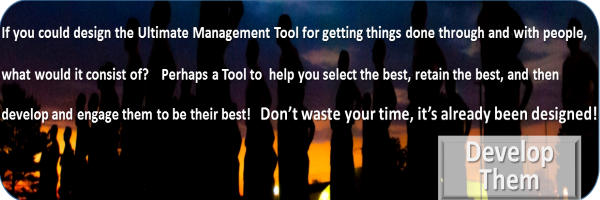Execute More Effectively This Year with Conscious Self-Management
All of us have natural tendencies that are key factors in how we respond to things in our life as we are trying to get stuff done. In this article, we're going to deal with two that make up the paradox that is an important factor in how we accomplish work, the trade-off between tempo and attention to detail.
To understand tempo, we have to look at its two related dimensions. First, it can be looked at as a need (or lack of a need) for speed and activity. Likewise, it is related to multitasking and a tendency, with a strong tendency here, to "have to have" many things going on at once to feel right about things. If you are a high tempo person , you will have a tendency to love activity and typically a need to have a lot of balls in the air simultaneously. If your tendency is low, you will tend to be methodical, wanting to work at one thing at a time. This is one of many traits measured by the HATS system, and in my dozen or so years of using it, I've seen this trait be very revealing and predictive.
How we make tradeoffs among two opposing tendencies or choices is an important determining factor in what we get accomplished. This is because how we do things is key to their outcome as I'm sure you'd agree. If you value telling it like it is without much regard for how it's received, you will be blunt but if you value the feelings of the receiver and have a low desire to get out what's in your head, you can come off as evasive. Likewise if you value straight talk but also have a diplomatic bent, you will be a strong communicator, able to get out clear thoughts and ideas while adjusting for impact on the listener. This an example of one of many paradoxical tradeoffs that we make naturally in trying accomplish things. It is one of many measured by the Harrison Assessment.
With regard to tempo, there is a relatively strong paradoxical trade-off with "attention to detail" (We use the term PRECISE to describe this in the Harrison world). If you have low score or tendency here, you will not enjoy detail tasks and more than likely will seek to avoid them. If you have a high score, you will be meticulous and if very high, will have a driving need to deal with the details, like, for example taking the result of simple multiplication or addition out a number of decimal places.
Now looking at the graph, you can see when you look at natural tendencies here, that if you are strong in both, you have what we call, balanced versatility which is often a natural strength. With this particular paradox, this is not as clear as most of the others. What we can say is that you likely move fast, probably like to multitask and are adept at handling details so you are effective at it. More importantly is when you have an imbalance. If you are low in precise but high in tempo, you fall into the mistake prone category and administrative and some technical jobs are typically not best for you. If you are high in precise but low in tempo, you tend to be overly meticulous and you may find it difficult to be pragmatic in getting things done that don't require much detail. On the other hand, you may be great at administrative or clerical tasks although maybe not so productive.
The key with any of these paradoxes is to understand yourself and in critical situations, to consciously manage yourself. This may mean delegating tasks that are not aligned with your natural tendencies. It could also mean structuring the task differently so that you can more effectively deal with you in accomplishing an outcome.. When we work with clients using the Harrison Assessment, because of the depth and insight in the 150+ traits measured, you can often find the strengths that can be utilized instead of weaknesses so the goal is achieved but the tasks to get there are different.
With regard to tempo, we have found, in our team building, that this is often a trait that underlies what is best described as a hidden misunderstanding that leads to major relationship (team) issues. Over and over again, we've seen major conflicts between executives on a team where the chief cause appears, after it is surfaced, to be a difference in their natural tempos. This is discussed in more detail in a past blog post here.




















 One of the most difficult challenges managers face is choosing the right people and understanding how to get them to perform at their best. During the last 12 years of our experience, we have found no other tool except the Harrison Assessment that enables this kind of capability with incredible accuracy and insight.
One of the most difficult challenges managers face is choosing the right people and understanding how to get them to perform at their best. During the last 12 years of our experience, we have found no other tool except the Harrison Assessment that enables this kind of capability with incredible accuracy and insight.















